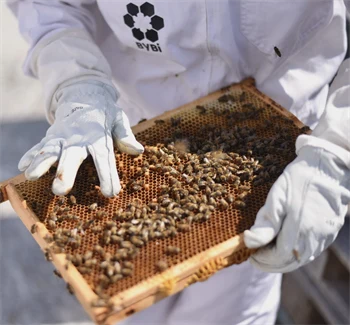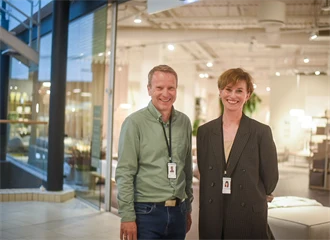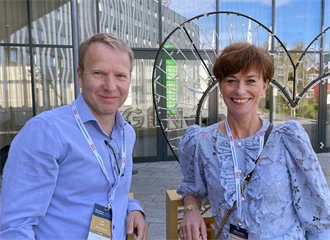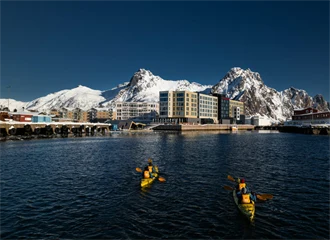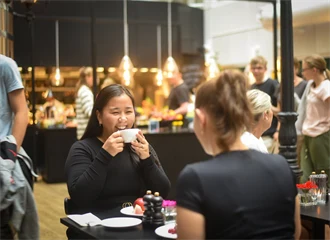Part of Thon Group sustainability efforts
Did you know that thousands of bees live on top of the Gunerius shopping centre in Oslo?
In the apiary, which is managed by the urban beekeepers association ByBi on behalf of the Thon Group, around 100 kilos of honey are produced each year.
The beehives themselves may not produce much more than honey, but the philosophy behind them can bear fruit in the future.
The Thon Group's sustainability strategy emphasises a contribution to limiting biodiversity loss in nature. An essential species for biodiversity is the bee, which spreads pollen through pollination and ensures that flowers and plants can produce new seeds. Read more about how the bees are part of the rooftop strategy of the Thon Group.
Interesting facts about bees
In Norway, we have no fewer than 208 different bee species – 35 species of bumblebees, 172 different wild bees and one species of honey bee.
Beekeepers examine how to best manage green areas
In order to focus on the important role played by bees in nature and increase expertise in the group in terms of making decisions on nature's terms, the Thon Group entered into a partnership in 2022 with the ByBi beekeepers association, which provides advice and guidance.
"At the core of our collaboration with the Thon Group is to teach people how a local impact on nature can have both a positive and negative effect," says the general manager of ByBi Bendik Walderhaug.
"As a company with so many properties, the Thon Group benefits from knowing how to use the available space as effectively as possible and seeing how rooftops and green areas can be managed in the future," says the beekeeper.
And this is where the rooftop bees at Gunerius come into the picture!
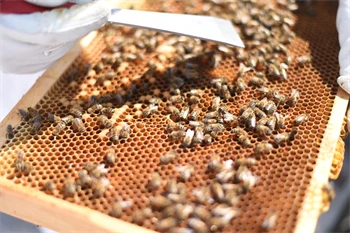
Increased knowledge and expertise among staff
"When we provide a habitat for bees in an urban environment, we are also facilitating other species At ByBi, we use apiaries as a communication arena where you learn about the insects' needs and with a little effort, can make a difference in improving living conditions for insects," explains Bendik.
In the apiary on Gunerius, ByBi holds courses for Thon Group staff members several times a year, ranging from the management team of the energy division at the head office to the operations managers of the shopping centres and hotels – and all other team members who are interested in learning more.
"In purely practical terms, it's all about having an arena where you can generate enthusiasm for bees and pollinating insects and build knowledge that can be used both professionally and personally," says Bendik.
"At the end of every course, the participants are able to go home and plant bee-friendly plants in their garden or on their balcony." If we manage to enshrine the same principle internally within the Thon Group and spread the enthusiasm to the shopping centres, hotels, commercial properties and planners, we can make a tremendous difference!
After all, ByBi is a partnership that is important in several ways.
"Not only is the support financially beneficial, but we also enjoy a larger catchment area through the Thon Group, with more and better opportunities to spread our knowledge. It's rewarding to work with a partner that embraces the responsibility to inspire a commitment to pollinating insects in its own ranks," adds Bendik.
Why bees?
- Bees are pollinating insects, which means that they transfer pollen between plants, which aids in fertilisation and the creation of new seeds.
- Up to 30 percent of all food we eat originates from plants pollinated by bees. That is why it is so important to keep the bee population growing in order to ensure crops and a food supply.
- Both wild bees and honey bees play a vital role in the ecosystem. Providing a habitat for bees in an urban environment also facilitates other species.
Source: WWF
Ski Storsenter's buzzing flower garden
Another establishment that has been inspired by the rooftop bees on Gunerius and is a great example of the future of space management is the shopping centre Ski Storsenter.
The large wildflower garden here has no fewer than around 5,000 bee-friendly plants.
These include lavender, larkspur, columbine and various fruit trees, all of which help to stimulate the bees in the late summer to ensure they have enough food. The centre also has its own rooftop apiary, which is managed with the help of beekeeper Alexander du Rietz, who also maintains the apiaries at the Thon Group shopping centres in Storo and Sandvika.
"Of all the sustainability initiatives we have launched, this is the one that has received the most positive feedback from people in the local community," says centre director Gro Collett.
"The garden is a popular lunch spot for kindergarten children in the area and one of our customers has also donated a bee hotel."
As an added bonus, the centre's bees produce around 250 kilos of honey each year, which is also served at the breakfast buffet at Thon Hotel Ski and can be purchased in the customer centre.
"With a flower garden and rooftop bees, we feel that we are using our space for something positive and doing our part to help the insects and wildlife in our community" says Gro and adds,
"It's also lots of fun to produce our own honey – and it tastes great!"
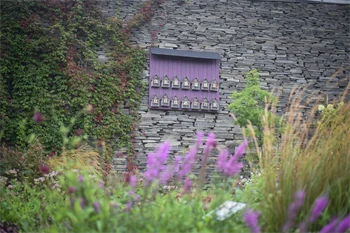
The Thon Group has rooftop beehives at several locations:
- Triaden shopping centre in Lørenskog
- Thon Hotel Gardermoen
- Storo Storsenter
- Sandvika Storsenter
- As well as the above-mentioned Gunerius and Ski Storsenter
"Anyone can do it, but the Thon Group also has a few ideas about why"
ByBi's beekeeper believes that the biggest task ahead is to turn around our aesthetic values and welcome disorder with open arms when planning and establishing green areas.
"We need to create and think in terms of nature and a productive environment, not only an attractive one," says Bendik.
"This is especially important in urban areas, which often have lots of flat surfaces and impregnated wood, which is not suitable for pollinating insects." Bees have a flight radius of three kilometres, but there needs to be an abundance of food sources and green areas within that area.
This means, for example, abandoning green, short-cut grass for more blooming ground covers, such as at Ski Storsenter.
"Anyone can create an apiary and hire a beekeeper to extract the honey, but the Thon Group also has a few ideas about why this should be done. That's what's really important here," says Bendik and adds,
"When a company that is responsible for so many properties – and with that the possibility to influence nature and the environment – sets a good example, this has a positive ripple effect. Not only can this inspire others to do the same, but also has considerable implications for the pollinating insects of the future."
About ByBi
- ByBi was established in 2012 and is the largest member of the Norwegian Beekeepers Association. The association has around 300 members, in addition to a large network of supporters and partners with a passion for bees, beekeeping and biodiversity in cities.
- ByBi is not only an environmental organisation that works continuously to create good living conditions for pollinating insects and biodiversity on a local level in Oslo, but also a small-scale honey producer.
- The Thon Group is a ByBi business affiliate and ByBi's largest and most important partner.
Source: ByBi
Contributors
-

- BW Bendik Walderhaug General Manager of ByBi
